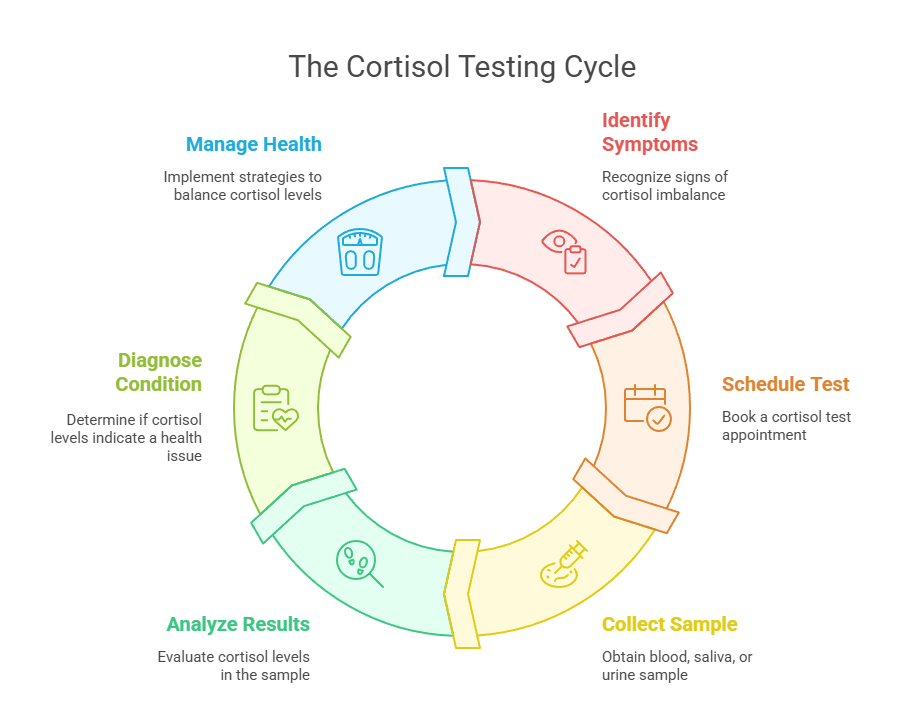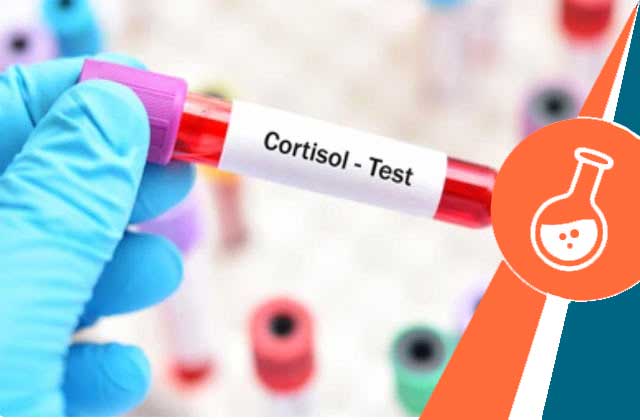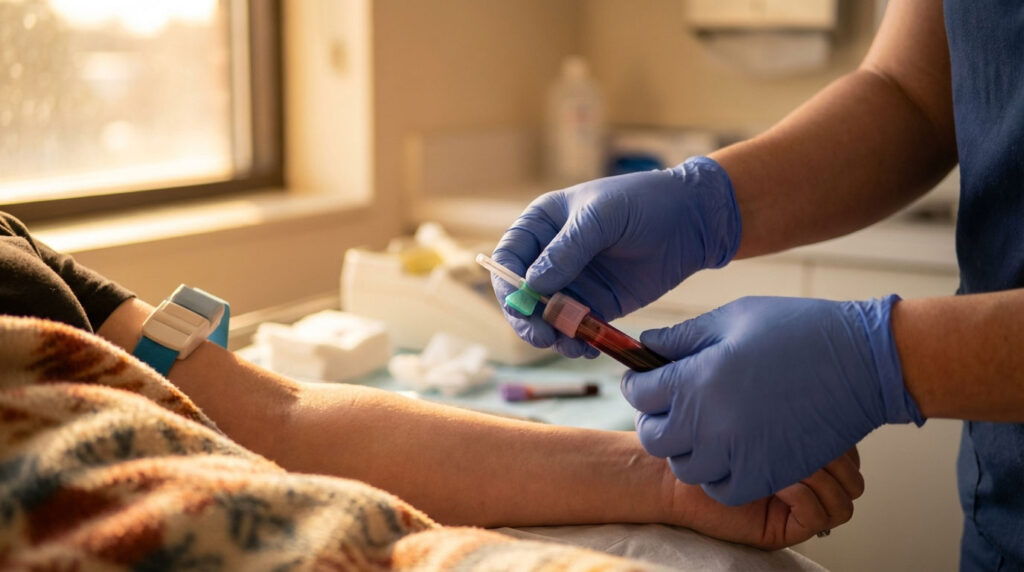
What is Cortisol Test?
A cortisol test measures the level of cortisol in the body, saliva, or a combination. Cortisol, often referred to as the “stress hormone,” plays a pivotal role in various bodily functions, including stress response, inflammation reduction, blood sugar regulation, and blood pressure control 1.
This test can help identify whether cortisol levels are abnormally high or low, which may indicate disorders related to the adrenal or pituitary glands or the impact of long-term steroid medication use.
Understanding cortisol levels is essential for diagnosing and managing conditions that affect almost every organ and tissue in the body.
About Cortisol Test
Learn everything about cortisol levels and tests before you book lab tests online. Understand the why, how, and what of this test.
Why Do Doctors Recommend Cortisol Tests?
A cortisol blood test indicates whether cortisol levels in the body are too high or too low, using blood, urine, or saliva samples.
- Diagnose Adrenal Gland Disorders 2:
- Cushing’s Syndrome: Indicated by excess cortisol.
- Addison’s Disease: Marked by insufficient cortisol due to adrenal damage.
- Secondary Adrenal Insufficiency: Caused by poor pituitary gland function affecting cortisol production.
- Monitor Treatment: Helps evaluate the effectiveness of treatments for these conditions.
- Assess Stress Impact: Identifies the body’s response to severe stress.
Importantly, cortisol influences various bodily systems, including the immune, nervous, circulatory, and skeletal systems, along with metabolism processes involving proteins, fats, and carbohydrates.
Symptoms and Causes of High Cortisol Levels
Levels higher than cortisol’s normal range are associated with Cushing’s syndrome, including symptoms like 3:
- Gaining weight
- Red, round face (flushed face)
- Weak muscles
- Balding or excessive hair growth
- High blood pressure
- Mood swings
- Fatigue
Some of the factors that cause high cortisol levels are- Adrenal gland tumours, genetic history of Cushing’s syndrome,& pituitary gland tumours.4
Symptoms and Causes of Low Cortisol Levels
Low cortisol levels or Addison syndrome may include symptoms like 5:
- Tiredness
- Losing weight
- Not feeling hungry
- Low blood pressure
Some of the factors that cause low cortisol levels are- Autoimmune diseases, damage to adrenal glands, or Adrenal haemorrhage.6
How To Prepare For Cortisol Test?
The steps below help you ensure that your Cortisol test provides the most accurate information about your health.
- Medication guidelines: Tell your healthcare provider about all the drugs, supplements or herbal remedies you are taking, as some substances may affect test results. Follow any specific instructions regarding drug adjustment before testing.
- Contact to doctor: Share your entire medical history with existing conditions or symptoms to help explain test results.
What Happens During Cortisol Testing?
A Cortisol Test only takes a few minutes.
- As per the scheduled time of the blood test, a Lab Technician who usually takes blood samples will arrive.
- A thin needle will be used to draw blood from your arm’s vein.
- The needle might cause a mild pinch and some discomfort.
- The lab technician then fills a collection tube with blood and then removes the needle from the skin.
- They place a small bandage on the arm
Please note: There might be slight pain or bruising at the spot of insertion, but most of the symptoms go away quickly.
Finding Cortisol Test
Should you book blood test online to check your health condition or go to the nearest clinic and get it done by a medical professional? Let’s Find Out
Can I Take a Cortisol Test At Home?
Yes, the Cortisol Test can be taken at home. HealthcareOnTime’s at-home lab testing service, in association with thyrocare, provides a convenient and efficient way to get blood testing done from the comfort of your own home without the need for a doctor’s visit or a trip to a lab. It’s important to note that it’s always a good idea to consult with an expert healthcare provider about any queries you may have about your test results.
How Much Does Cortisol Test Cost?
The Cortisol test price varies significantly depending on many factors:
- Location: The Cortisol test prices in India may vary depending on the city or the region in which the test is conducted. For example, in Bangalore or Mumbai, it might be expensive as compared to small towns.
- Type of facility centres: The Cortisol test charge also varies between private hospitals, government hospitals, and diagnostic centres. Cost is lower in government hospitals as compared to private ones.
- Healthcare centres: Diagnostic centres, laboratories and hospitals may have different Cortisol test prices. It depends upon the benefits and reputation of the healthcare centre.
- Insurance Coverage: Individuals with health insurance can cover partial or all costs depending on their policy coverage and network providers.
- Additional services: Additional services such as home sample collection, express test results, or additional charges for special management may be paid, which contributes to the overall Cortisol test price.
Generally, the Cortisol test cost in India ranges from Rs. 350 to Rs. 800. By opting for HealthcareOnTime lab test at-home facilities, you can access Cortisol test at the cost of INR 500.
Test Results Interpretations
You received your cortisol hormone test results but still need help determining if they fall under the normal range. Read this section to know if your results range between the cortisol test and the Cortisol blood test normal range.
What Do Cortisol Test Results Mean?
The results will depend on the cortisol blood test’s normal range and indicate several causes based on the cortisol levels 7. Let’s take a look.
High Cortisol Levels:
- High doses of certain medications
- Tumours in the pituitary gland produce adrenocorticotropic hormone (ACTH)
- Tumours in the adrenaline gland, which produces too much cortisol
- Tumours in other parts of the body, like small-cell lung cancer
Low cortisol levels:
- Tumors in the pituitary gland slowing down ACTH production
- Adrenal glands not working properly or damaged
- Pituitary gland not working properly
What is a Cortisol Test’s Normal Range?
Cortisol’s normal range depends on the person and time of the test.8
For Blood Test | For Urine Test | For Saliva Test |
6 am to 8 am: 10-20 mcg/dL | 10-55 micrograms per day (mcg/day) | Morning: 10.2-27.3 nanograms per millilitre (ng/mL) |
Around 4 pm: 3-10 mcg/dL | Night: 2.2-4.1 ng/mL |
Discuss your test results and their implications with your healthcare provider to understand their significance.
What Medical Conditions Can Cause High Cortisol Levels?
There are several reasons why the adrenal gland may release too much cortisol.
- Stress triggers a combination of signals from hormones and nerves, which causes the adrenaline glands to release adrenaline and cortisol.
- Pituitary conditions, such as an overactive pituitary gland, benign pituitary tumours like adenomas, or cancerous pituitary tumours, can cause high cortisol levels.
- Adrenal tumours on the adrenaline gland itself cause too much cortisol.
- Corticosteroid medication side effects9
What Medical Conditions Can Cause Low Cortisol Levels?
Different causes of low cortisol levels are 10:
- Addison’s disease, an autoimmune disorder, is one cause, as it attacks the adrenal glands, disrupting cortisol production.
- An underactive pituitary gland can also lead to low cortisol levels.
- Adrenal fatigue is another potential contributor to decreased cortisol levels.
Sources
Ref Links:
More Related Tests
Why To Book with HealthCareOnTime

17 Crores+ Samples Processed

World Class Technology Labs

25+ Years of Trust & Experience

Free Home Collection
FAQs Around Cortisol Test
How much does Cortisol Test cost?
The Cortisol Test cost is Rs.750, although it is now available for Rs.500 because of the offer.










